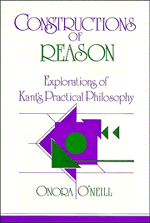5 - Consistency in action
Published online by Cambridge University Press: 05 June 2012
Summary
Universality tests in autonomous and in heteronomous ethics
Many recent discussions of universality tests, particularly those in English, are concerned either with what everybody wants done or with what somebody (usually the agent; sometimes an anonymous moral spectator) wants done either by or to everybody. This is true of the universality tests proposed in Singer's Generalization Argument, in Hare's Universal Prescriptivism and generally of various formulations of Golden Rules as well as of Rule Utilitarianism. Since universality tests of these sorts all make moral acceptability in some way contingent upon what is wanted (or, more circumspectly expressed, upon what is preferred or found acceptable or promises the maximal utility), they all form part of moral theories that are heteronomous, in Kant's sense of that term. Such theories construe moral acceptability as continent upon the natural phenomena of desire and inclination, rather than upon any intrinsic or formal features of agents or their intentions. If we rely on any of these proposed criteria of moral acceptability, there will be no types of act that would not be rendered morally acceptable by some change or changes in human desires.
By contrast Kant's proposed universality test, the Categorical Imperative, contains no reference either to what everybody wants done or to what somebody wants done either by or to everybody. Kant's first formulation of the Categorical Imperative, the so-called Formula of Universal Law, runs:
Act only on that maxim through which you can at the same time will that it should become a universal law. (G, IV, 421)
- Type
- Chapter
- Information
- Constructions of ReasonExplorations of Kant's Practical Philosophy, pp. 81 - 104Publisher: Cambridge University PressPrint publication year: 1990
- 2
- Cited by



